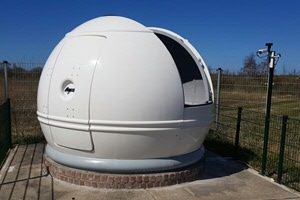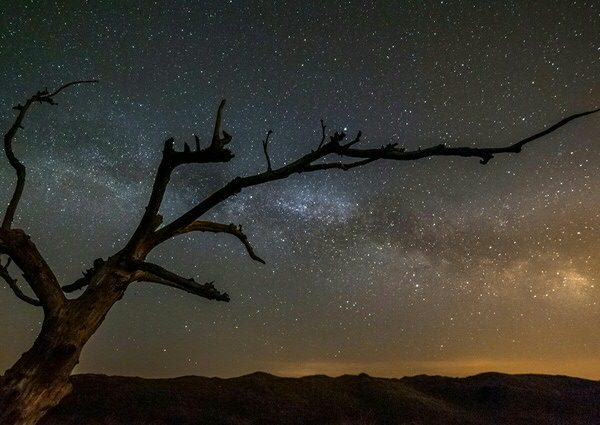National Forest Service and University of Groningen launch Dark Sky Park Lauwersmeer Telescope
During the Nacht van het Wad (Night of the Wadden) and the Nacht van de Nacht (Night of the Night) on 30 October King’s Commissioner for Groningen René Paas will officially launch the Dark Sky Lauwersmeer Telescope. The telescope is the result of a collaboration between the University of Groningen and the National Forest Service (Staatsbosbeheer), with the support of the Gratama Foundation. Students of the degree programme in Astronomy can use the telescope to enhance their observation skills.

It is no coincidence that the telescope is located in the Lauwersmeer National Park: this nature reserve is one of the last places in our country where it still gets really dark at night. At the initiative of the Province of Groningen and the National Forest Service, the Lauwersmeer area received the Dark Sky Park predicate from the International Dark Sky Association in 2016. This makes the area one of the 40 Dark Sky Parks in Europe that are protected from light pollution and where visitors are welcome to experience the darkness at night. The National Forest Service and the Kapteyn Institute, the UG's research institute for Astronomy, have been asked to provide visitors with information about the stars, which you can see exceptionally well from this area.
Bright, starry sky
The Blaauw Observatory at the Zernike Campus was not big enough to accommodate the growing number of Astronomy students, and the view from the telescope became muddled by light pollution from the surrounding area. Thus, the idea emerged at the Kapteyn Institute to place a remote-controlled, robotic telescope at the Dark Sky Park Lauwersmeer. The National Forest Service, the caretaker of the park, assisted in this and, with the financial aid from the Gramata Foundation, the telescope is now ready for use. Additionally, the Province of Groningen has provided the telescope with a wheelchair-accessible observation platform, so visitors will have a place to look up at the starry sky as well. At the Lauwersnest Activity Centre, special attention will be paid to the darkness of the area.
Donkerte van de Wadden
In other areas of the Wadden Sea world heritage region, darkness can be still be found too, making this area unique to the Netherlands. The view of the starry night sky is increasingly being threatened by light pollution in our densely populated country. The National Forest Service and the University of Groningen have therefore worked together with the nature and environment federations (Natuur en Milieufederaties) of the provinces of Friesland, Groningen and Noord-Holland, the Society for the Preservation of Nature in the Netherlands (Natuurmonumenten), and the Wadden Society (Waddenvereniging) to start the programme Donkerte van de Wadden (Darkness of the Wadden). All these parties are committed to preserving darkness: the nature and environment federations, for example, have been organizing the Nacht van de Nacht for 17 years, during which events are organized and companies and municipalities snuff out the lights. The Donkerte van de Wadden programme aims to create sustainable 'darkness tourism’ along the entire Wadden coastline, and to increase society’s appreciation for the power and value of true darkness.

30 October: a night of darkness
This year, the Nacht van de Nacht and the Nacht van het Wad, an initiative of the Donkerte van de Wadden, will both happen on 30 October. Together, they offer visitors a programme filled with darkness-related activities at the Lauwersmeer National Park. As the crown achievement of the five-year collaboration between the National Forest Service and the University of Groningen, the telescope is ready for use and will be officially opened by King’s Commissioner of Groningen René Paas on the night of 30 October.
More information
- Information for visitors of the Nacht van het Wad can be found here: www.nachtvanhetwad.nl
- Information for visitors of the Donkerte van de Wadden can be found here: www.donkertevandewadden.nl
| Last modified: | 01 November 2021 11.37 a.m. |
More news
-
03 April 2025
IMChip and MimeCure in top 10 of the national Academic Startup Competition
Prof. Tamalika Banerjee’s startup IMChip and Prof. Erik Frijlink and Dr. Luke van der Koog’s startup MimeCure have made it into the top 10 of the national Academic Startup Competition.
-
01 April 2025
NSC’s electoral reform plan may have unwanted consequences
The new voting system, proposed by minister Uitermark, could jeopardize the fundamental principle of proportional representation, says Davide Grossi, Professor of Collective Decision Making and Computation at the University of Groningen
-
01 April 2025
'Diversity leads to better science'
In addition to her biological research on ageing, Hannah Dugdale also studies disparities relating to diversity in science. Thanks to the latter, she is one of the two 2024 laureates of the Athena Award, an NWO prize for successful and inspiring...
